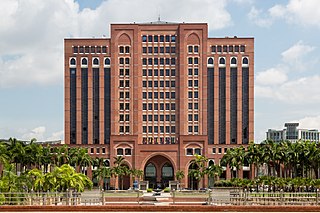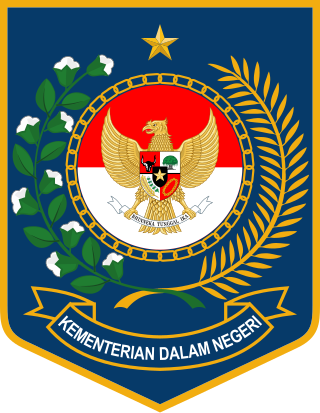The Congress of Union of Employees in the Public and Civil Services Malaysia, abbreviated CUEPACS, is a national trade union centre in Malaysia. It has a membership of 1,200,000.

The Ministry of Home Affairs, abbreviated KDN, MOHA, is a ministry of the Government of Malaysia that is responsible for home affairs: law enforcement, public security, public order, population registry, immigration, foreign workers, management of societies, anti-drug, publication / printing / distribution of printed materials, film control, management of volunteer, rehabilitation and implementation of punishment.

The Ministry of Defence, abbreviated MINDEF or KEMENTAH, is a ministry of the Government of Malaysia that is responsible for defence, national security, army, navy, hydrography, air force, armed forces, intelligence services, counterintelligence, military intelligence, national service, and veterans affairs.

The Ministry of Home Affairs is an interior ministry of the government of Indonesia responsible for matters of the state. The ministry was formerly known as the Department of Home Affairs until 2010 when the nomenclature of the Department of Home Affairs was changed to the Ministry of Home Affairs in accordance with the Regulation of the Minister of Home Affairs Number 3 of 2010 on the Nomenclature of the Ministry of Home Affairs.

The Prime Minister's Department is a federal government ministry in Malaysia. Its objective is "determining the services of all divisions are implemented according to policy, legislation / regulations and current guidelines". It is headed by the Prime Minister of Malaysia followed by other Minister in the Prime Minister's Department. The Department consists of the Prime Minister's Office, the Deputy Prime Minister's Office and more than 50 other government agencies and entities. The Prime Minister's Department was established on July 1957. Its headquarters are in Perdana Putra, Putrajaya.

The Ministry of Finance, abbreviated MOF, is a ministry of the Government of Malaysia that is charged with the responsibility for government expenditure and revenue raising. The ministry's role is to develop economic policy and prepare the Malaysian federal budget. The Ministry of Finance also oversees financial legislation and regulation. Each year in October, the Minister of Finance presents the Malaysian federal budget to the Parliament.

The Ministry of Works, abbreviated KKR, is a ministry of the Government of Malaysia that is responsible for public works, highway authority, construction industry, engineers, architects and quantity surveyors.

The Malaysian Ministry of Youth and Sports, abbreviated KBS, is a ministry of the Government of Malaysia that is responsible for youth, sports, recreation, leisure activities, stadiums, youth development, and youth organisations in the country.

The Ministry of Human Resources, abbreviated MOHR, is a ministry of the Government of Malaysia that is responsible for skills development, labour, occupational safety and health, trade unions, industrial relations, industrial court, labour market information and analysis, social security.

The Ministry of Natural Resources, Environment and Climate Change, is a ministry of the Government of Malaysia that is responsible for energy, natural resources, environment, climate change, land, mines, minerals, geoscience, biodiversity, wildlife, national parks, forestry, surveying, mapping and geospatial data.

The Ministry of Rural and Regional Development is a ministry of the Government of Malaysia that is responsible for rural development, regional development, community development, Bumiputera, Orang Asli, rubber industry smallholders, land consolidation, land rehabilitation.

The Ministry of Local Government Development, abbreviated KPKT, is a ministry of the Government of Malaysia that is responsible for urban well-being, housing, local government, town planning, country planning, fire and rescue authority, landscape, solid waste management, strata management, moneylenders, pawnbrokers.
Aishah binti Ghani was a Malaysian politician who served as Minister of Social Welfare from 1973 to 1984 and Head of Wanita UMNO women's Malaysia from 1972 to 1984.

The Ministry of State Secretariat is a government ministry responsible for providing technical, administrative, and analytical support to the President and Vice President in the exercise of their state powers. The current minister of state secretariat is Pratikno, who previously served as Rector of Gadjah Mada University in Yogyakarta.

The Ministry of Agriculture and Food Security, abbreviated MAFS, is a ministry of the Government of Malaysia that is responsible for agriculture, agro-based industry, agritourism, livestock, veterinary services, fisheries, quarantine, inspection, agricultural research, agricultural development, agricultural marketing, pineapple industry, agribusiness, botanical garden, food security, food sovereignty.

Rina binti Mohd Harun is a Malaysian politician who served as Minister of Women, Family and Community Development for the second term in the Barisan Nasional (BN) administration under former Prime Minister Ismail Sabri Yaakob from August 2021 to the collapse of the BN administration in November 2022 and the first term in the Perikatan Nasional (PN) administration under former Prime Minister Muhyiddin Yassin from March 2020 to August 2021, Minister of Rural Development in the Pakatan Harapan (PH) administration under former Prime Minister Mahathir Mohamad from May 2018 to the collapse of the PH administration in February 2020. She also served as the Member of Parliament (MP) for Titiwangsa from May 2018 to November 2022. She has also served as 1st Women Chief of the Malaysian United Indigenous Party (BERSATU), a component party of the PN coalition, since April 2017. Prior to joining BERSATU at its inception in 2016, she was a United Malays National Organisation (UMNO) member.

The Ministry of Culture, Youth and Sports, Brunei Darussalam is a ministry in the Government of Brunei Darussalam responsible for the policies and development of the country's national culture, youth, and sports. It was established immediately upon Brunei's independence on 1 January 1984. It is led by a minister, and the incumbent is Nazmi Mohamad who has held office since 7 June 2022. The ministry is headquartered in Bandar Seri Begawan, in the Brunei-Muara District of the sultanate of Brunei Darussalam.

The Ministry of National Development Planning/National Development Planning Agency is a ministry of the Republic of Indonesia that has the task to oversee government affairs in the field of national development planning to assist the President in organizing state government. The minister is responsible to the President. The Ministry of National Development Planning uses organizational units and resources within the National Development Planning Agency.








